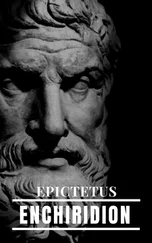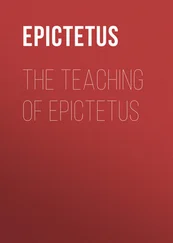1.The contrast intended is between γράφω, "write," § 2, and συγγράφω, "compose." Arrian had in mind, no doubt, the works of Plato and Xenophon, which, although they purported to reproduce the words of Socrates, were in fact highly finished literary compositions.
Chapter I.
Of the things which are under our control and not under our control
Table of Contents
Among the arts and faculties 1in general you will find none that is self-contemplative, and therefore none that is either self-approving or self-disapproving. How far does the art of grammar possess the power of contemplation? Only so far as to pass judgement upon what is written. How far the art of music? Only so far as to pass judgement upon the melody. Does either of them, then, contemplate itself? Not at all. But if you are writing to a friend and are at a loss as to what to write, the art of grammar will tell you; yet whether or no you are to write to your friend at all, the art of grammar will not tell. The same holds true of the art of music with regard to melodies; but whether you are at this moment to sing and play on the lyre, or neither sing nor play, it will not tell. What art or faculty, then, will tell? That one which contemplates both itself and everything else. And what is this? The reasoning faculty; for this is the only one we have inherited which will take knowledge both of itself—what it is, and of what it is capable, and how valuable a gift it is to us—and likewise of all the other faculties. 5For what else is it that tells us gold is beautiful? For the gold itself does not tell us. Clearly it is the faculty which makes use of external impressions. What else judges with discernment the art of music, the art of grammar, the other arts and faculties, passing judgement upon their uses and pointing out the seasonable occasions for their use? Nothing else does.
As was fitting, therefore, the gods have put under our control only the most excellent faculty of all and that which dominates the rest, namely, the power to make correct use of external impressions, but all the others they have not put under our control. Was it indeed because they would not? I for one think that had they been able they would have entrusted us with the others also; but they were quite unable to do that. For since we are upon earth and trammelled by an earthy body and by earthy associates, how was it possible that, in respect of them, we should not be hampered by external things?
10But what says Zeus? "Epictetus, had it been possible I should have made both this paltry body and this small estate of thine free and unhampered. But as it is—let it not escape thee—this body is not thine own, but only clay cunningly compounded. Yet since I could not give thee this, we have given thee a certain portion of ourself, this faculty of choice and refusal, of desire and aversion, or, in a word, the faculty which makes use of external impressions; if thou care for this and place all that thou hast therein, thou shalt never be thwarted, never hampered, shalt not groan, shalt not blame, shalt not flatter any man. What then? Are these things small in thy sight?" "Far be it from me!" "Art thou, then, content with them?" "I pray the Gods I may be." 2
But now, although it is in our power to care for one thing only and devote ourselves to but one, we choose rather to care for many things, and to be tied fast to many, even to our body and our estate and brother and friend and child and slave. 15Wherefore, being tied fast to many things, we are burdened and dragged down by them. That is why, if the weather keeps us from sailing, we sit down and fidget 3and keep constantly peering about. "What wind is blowing?" we ask. Boreas. "What have we to do with it? When will Zephyrus blow?" When it pleases, good sir, or rather when Aeolus pleases. For God has not made you steward of the winds, but Aeolus. 4"What then?" We must make the best of what is under our control, and take the rest as its nature is. "How, then, is its nature?" As God wills.
"Must I, then, be the only one to be beheaded now?" Why, did you want everybody to be beheaded for your consolation? Are you not willing to stretch out your neck as did a certain Lateranus 5at Rome, when Nero ordered him to be beheaded? For he stretched out his neck and received the blow, but, as it was a feeble one, he shrank back for an instant, and then stretched out his neck again. 20Yes, and before that, when Epaphroditus, a freedman of Nero, approached a certain man and asked about the ground of his offence, he answered, "If I wish anything, I will speak to your master." 6
"What aid, then, must we have ready at hand in such circumstances?" Why, what else than the knowledge of what is mine, and what is not mine, and what is permitted me, and what is not permitted me? I must die: must I, then, die groaning too? I must be fettered: and wailing too? I must go into exile: does anyone, then, keep me from going with a smile and cheerful and serene? "Tell your secrets." I say not a word; for this is under my control. "But I will fetter you." What is that you say, man? fetter me ? My leg you will fetter, but my moral purpose not even Zeus himself has power to overcome. "I will throw you into prison." My paltry body, rather! "I will behead you." Well, when did I ever tell you that mine was the only neck that could not be severed? 25These are the lessons that philosophers ought to rehearse, these they ought to write down daily, in these they ought to exercise themselves.
Thrasea used to say: "I would rather be killed to-day than banished to-morrow." What, then, did Rufus say to him? "If you choose death as the heavier of two misfortunes, what folly of choice! But if as the lighter, who has given you the choice? Are you not willing to practise contentment with what has been given you?"
Wherefore, what was it that Agrippinus used to remark? "I am not standing in my own way." 7Word was brought him, "Your case is being tried in the Senate."—"Good luck betide! But it is the fifth hour now" (he was in the habit of taking his exercise and then a cold bath at that hour); "let us be off and take our exercise." 30After he had finished his exercise someone came and told him, "You have been condemned."—"To exile," says he, "or to death?"—"To exile."—"What about my property?"—"It has not been confiscated."—"Well then, let us go to Aricia and take our lunch there." This is what it means to have rehearsed the lessons one ought to rehearse, to have set desire and aversion free from every hindrance and made them proof against chance. I must die. If forthwith, I die; and if a little later, I will take lunch now, since the hour for lunch has come, and afterwards I will die at the appointed time. How? As becomes the man who is giving back that which was another's.
1.δυνάμεις includes arts as well as faculties, and both are dealt with in this context.
2.Compare I. ii. 38.
3.The exact meaning of σπὠμενοι is uncertain.
4.Alluding to Homer, Odyssey , X. 21.
5.For all ordinary proper names the reader is referred to the Index.
6.The point of the retort lies in the defiance of the officious but all-powerful freedman.
7.The idea seems to be: By disregarding externals I do not hinder the natural course of my mind and character, that is, my true self.
Chapter II.
How may a man preserve his proper character 1upon every occasion?
Table of Contents
To the rational being only the irrational is unendurable, but the rational is endurable. Blows are not by nature unendurable.—How so?—Observe how: Lacedaemonians take a scourging 2once they have learned that it is rational.—But is it not unendurable to be hanged?—Hardly; at all events whenever a man feels that it is rational he goes and hangs himself. In short, if we observe, we shall find mankind distressed by nothing so much as by the irrational, and again attracted to nothing so much as to the rational.
Читать дальше












